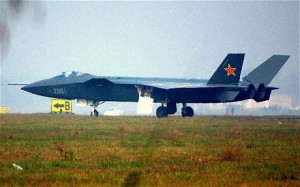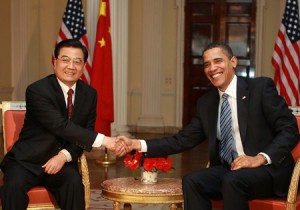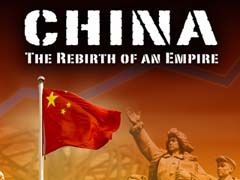 It’s clear why China timed the first public display of its new stealth bomber a couple of weeks ago to coincide with the first visit by a U.S. defense secretary in more than ten years: China wanted to signal its rise not just as an economic superpower, but as a military one too.
It’s clear why China timed the first public display of its new stealth bomber a couple of weeks ago to coincide with the first visit by a U.S. defense secretary in more than ten years: China wanted to signal its rise not just as an economic superpower, but as a military one too.
I’ve been concerned about the development of the anti-ship cruise and ballistic missiles ever since I took this job. They clearly have the potential to put some of our capabilities at risk and we have to pay attention to them. We have to respond appropriately with our own programs.
(U.S. Defense Secretary Robert Gates, London Independent, Reuters, January 8, 2011)
Mind you, the amount the U.S. spends on its military buildup is almost equal to the amount all other countries of the world spend … combined, including China. For example, according to the independent Stockholm International Peace Research Institute, the U.S. spends over $650 billion annually; whereas, China, which ranks second, spends less than $100 billion.
Which makes U.S. concerns about China in this context rather like an elephant being concerned about a flee flittering about its ass. Not to mention the arrogant and self-righteous hypocrisy inherent in them.
Instead, what really worries the U.S. is the leverage China is developing as an economic superpower. In fact, President Hu Jintao meeting with President Obama today is rather like a banker meeting with his richest, but most indebted, customer. No doubt this is why political commentators are saying Obama is laying out the red carpet to curry favor with Hu.
But even here, putative U.S. worries are unwarranted. Here’s why:
[A]ny real attempt by China to squeeze the U.S. financially would amount to an unprecedented case of cutting off one’s nose to spite one’s face. After all, the U.S. market is even more indispensable to China’s economic growth than China’s credit is to the U.S.’s.
(World beware, China calling in its (loan-sharking) debts, The iPINIONS Journal, February 3, 2010)
Both China and the U.S. are acutely mindful that any unilateral alteration in this mutually dependent economic relationship would amount to mutually assured destruction (MAD). This is why, just as the U.S. and Soviet Union balanced their military relationship based on this MAD concept, the U.S. and China are now balancing their economic relationship on the same concept.
 Moreover, instead of sworn enemies who must grudgingly show mutual respect (as was the case with the U.S. and Soviet Union), the U.S. and China are like two people in an unhappy marriage who dare not divorce (for whatever reason) and therefore continue to put on a happy face.
Moreover, instead of sworn enemies who must grudgingly show mutual respect (as was the case with the U.S. and Soviet Union), the U.S. and China are like two people in an unhappy marriage who dare not divorce (for whatever reason) and therefore continue to put on a happy face.
This is not to say they won’t have frank discussions about the U.S. deficit spending and China currency manipulation that have created a seemingly terminal, but untenable bilateral trade imbalance in China’s favor. But this will be tantamount to that unhappily married couple arguing for the one-hundredth time about the wife’s profligate spending habit and the husband’s self-righteous lectures on fiscal responsibility.
So when all is said and done, the U.S.-China trade imbalance will continue to redound to China’s favor – with the U.S. falling even further in its debt….
In the meantime, just as this couple would be competing for enabling allies within their circle of friends, the U.S. and China are doing all they can to win friends and influence countries in the international community. And, in this context, U.S. concerns are truly warranted.
After all, China is rapidly supplanting the U.S. as the indispensable superpower in many countries throughout the developing world.
China has lent more money to other developing countries over the past two years than the World Bank, a stark indication of the scale of Beijing’s economic reach and its drive to secure natural resources.
(Financial Times, January 18, 2011)
This means that, even though China dares not flex its loan-sharking muscles against the U.S., it could squeeze many other countries, including U.S. allies, so tight they’d agree to do China’s bidding even if it undermines U.S. interests.
 Reports abound about the way these two superpowers are variously competing or collaborating to influence or control North Korea’s nuclear ambition. Less reported is the way China has been buying up allies in Asia, Africa, the Caribbean and Latin America with success the Soviet Union could never have imagined.
Reports abound about the way these two superpowers are variously competing or collaborating to influence or control North Korea’s nuclear ambition. Less reported is the way China has been buying up allies in Asia, Africa, the Caribbean and Latin America with success the Soviet Union could never have imagined.
The U.S. finally seems to be waking up to this stealth operation. But here’s how I warned years ago not only of China’s rebirth as a global empire, but of the consequences:
What happens if China decides it is in its strategic national interest to convert the container ports, factories, and chemical plants it has funded throughout the Caribbean into dual military and commercial use? Would these governments comply? Would they have any real choice? And when they do comply, would the U.S. then blockade that island – the way it blockaded Cuba during the missile crisis? Now consider China making such strategic moves in Latin America where its purportedly benign Yuan diplomacy dwarfs its Caribbean operations. This new Cold War could then turn very hot indeed….
(China buying up political dominion, The iPINIONS Journal, February 22, 2005)
And here:
This episode of naked bullying should serve as a warning to all countries around the world that are not just lapping up China’s largesse, but heralding it as a more worthy superpower than the United States. Because if the Chinese can spit such imperious and vindictive fire at the U.S. over a relatively insignificant matter like meeting the Dalai Lama, just imagine what they would do to a less powerful country in a conflict over a truly significant matter.
(World beware, China calling in its (loan-sharking) debts, The iPINIONS Journal, February 3, 2010)
Of course, this is not to say that all is hunky-dory in China. But there’s nothing like state control of all media to ensure that all problems with the government’s modernization plans are overlooked. Yet even I was sufficiently aware of China’s indigenous problems to comment as follows five years ago:
Despite a rate of growth that is the envy of the world, China’s economy is, in fact, a ticking time bomb. Because the one billion people providing cheap labor to fuel its boom represent mushrooming fuel demands that portend its bust…
Not to mention that the affectations of modernity and freedom in China’s big cities are designed to divert attention from the feudal, barren and collectivized rural areas where the vast majority of its people still reside … and where unreported restiveness is simmering among gentrified, marginalized and disaffected farmers.
(Gap between rich and poor in China sowing seeds of terminal unrest, The iPINIONS Journal, December 22, 2005)
In any case, Obama is duly rolling out the red carpet for Hu not because China has the U.S. by the proverbial balls financially, but because China is becoming almost as influential in the global community as the U.S. And no country is more worthy of such honor and respect.
I only hope he does a better job of hosting Hu than his predecessor did in 2006, when Hu’s welcoming ceremony was marred by a Falun Gong worshiper (think Scientologist) heckling him as an ungodly murderer. (I suspect President Bush had a very difficult time convincing Hu this outburst was not orchestrated by the U.S. just to embarrass China….)
Finally, I regret to inform my liberal friends that purported U.S. concerns about human rights in China will figure about as prominently in discussions during Hu’s visit here as China concerns about gun violence in the U.S. figured in discussions during Obama’s visit to China last year.
Specifically, Obama will proffer the same platitudes about universal human rights every U.S. president has proffered since Nixon opened relations with China in the early 1970s. And Hu will offer the same mind-your-own-business reply every Chinese leader has offered in kind.
But the U.S. might want to temper its moral indignation a little – given that just 50 years ago blacks in America were suffering the kind of human rights abuses that make those Chinese citizens are suffering today seem positively benign.
Related commentaries:
World beware…
Gap between rich and poor…
Leave a Reply
You must be logged in to post a comment.